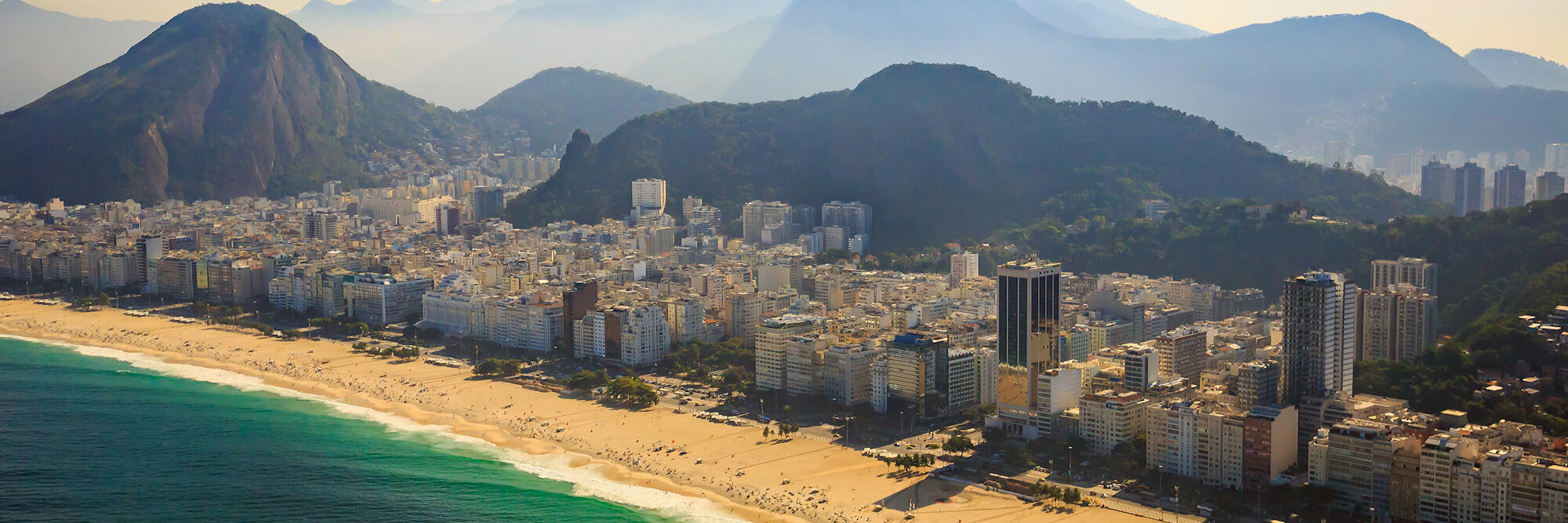Niamh is an Irish woman who has been living in Brazil for a few years. She is married to a Brazilian, and they call Rio de Janeiro their home. Having grown up in Galway, on the west coast of Ireland, Niamh finds Rio busy and noisy in comparison, but loves the outdoor lifestyle and can’t think of a better way to start the day than with a run on Ipanema beach.
Read more about the country in the Expat Arrivals Brazil guide or read more expat experiences in Brazil.
 About Niamh
About Niamh
Q: Where are you originally from?
A: Galway, on the west coast of Ireland
Q: Where are you living now?
A: Gavea, Rio de Janeiro, Brazil
Q: How long have you lived here?
A: Two and a half years
Q: Did you move with a spouse/children?
A: No, my husband lived in Rio
Q: Why did you move to Brazil? What do you do?
A: I moved here in September 2009 and married my husband in January 2010. I always knew I wanted to work in Clinical Psychology here, but the validation process of my diplomas took much more time than I expected, so I spent the initial year studying Portuguese, taking a distance-learning course in Psychotherapy and studying Family Therapy at Instituto Noos in Botafogo.
About Rio de Janeiro
Q: What do you enjoy most about your host city? How’s the quality of life?
A: Without question, the beach. I can’t think of a better way to start the day than a run along Leblon and Ipanema beach. I love the outdoor lifestyle here; you’re always close to nature. I love to get away from the noise and craziness of the city and head to Pedra da Gavea or Tijuca forest.
Q: Any negatives? What do you miss most about home?
A: Of course, I miss my family and friends. Being from a small town on the west coast of Ireland, I find the city very busy and noisy.
Q: Is Rio de Janeiro safe?
A: I consider the city safe, considering that you’re always aware of the potential for danger. Personally, I try not to draw attention to myself by not using luxury products or wearing expensive jewellery.
About living in Brazil
Q: Which are the best places/suburbs to live in Rio as an expat?
A: I love Gavea and Jardim Botanico, as I believe they both have a village feel. Living in Gavea, I have the best of both worlds – I can look out onto the green forest and hear birds singing in the morning, and I can also cycle to Leblon/Ipanema for beach, shopping, restaurants, etc.
Q: How do you rate the standard of accommodation in Rio?
A: I find rent prices very high here. Generally, apartments come unfurnished, and Cariocas are generally quite happy to do some improvement work on an apartment when they move. I think this is more difficult for the expat as they are generally here for a fixed and relatively short period of time and are thus less inclined to invest in home improvements. It can be very difficult to find an apartment that is ready to move into.
Q: What’s the cost of living in Brazil compared to home? What is cheap or expensive in particular?
A: In general, I find Rio much more expensive than Dublin, the last city in which I lived in Ireland. Property and rental prices are particularly expensive, as is eating out, clothes, electro domestics. Grocery shopping is cheaper here, and in particular, fruit and vegetables at the weekly feira.
Q: What are the locals like; do you mix mainly with other expats?
A: As my husband is Brazilian, I now have an equal mix of Brazilian and expat friends. Initially, I found it easier to connect with expats as my level of Portuguese left me feeling frustrated when trying to converse with Brazilians. Additionally, other expats can empathise with you regarding feeling displaced, lonely, homesick, etc. I think it’s important to have a balance of friendships with expats and locals; that way, you get the support you need from others in a similar position to you, but you also get to experience the city as a local.
Q: Was it easy meeting people and making friends in Rio?
A: I met most of my expat friends through Portuguese language courses and meet-ups or expat social networking groups. I believe you have to make an effort to put yourself out there and turn up to such groups, but once there, it’s easy to make friends as everyone is in the same position and wants to connect with others.
I found it a little more difficult to make Brazilian friends. Even though my husband is Brazilian and has a large circle of friends, so that’s how I was introduced to many Brazilians. I found it was difficult to progress to the next level of a more intimate friendship. This required more effort, but I’m glad to say that it was worth it and I value my Brazilian friends very much.
About working in Brazil
Q: Did you have a problem getting a work visa/permit for Brazil?
A: As I have a permanent resident visa, I am entitled to work here, but like most things, it took quite a bit of effort and time to secure this. In addition, it took over a year and a half to have my qualifications validated here.
Q: What’s the economic climate like in Rio? Is there plenty of work?
A: In my opinion, there are many employment opportunities here in Rio, although it is necessary to speak Portuguese.
Q: How does the work culture differ from home?
A: I can only speak from my own experience of working within the mental health field. In Ireland, most healthcare workers work within the public health sector, whereas here in Brazil, it seems to be the opposite, with the majority of healthcare professionals working privately. Also, most seem to work independently, as opposed to forming multidisciplinary clinics, as is common in Ireland.
Q: Did a relocation company help you with your move?
A: No, although I can see how such services could make the move much easier.
Family and children in Brazil
Q: Did your spouse or partner have problems adjusting to their new home?
A: My husband is Brazilian and from Rio, so he was happy to return.
Q: How would you rate the healthcare?
A: I think the level of private healthcare here is very good, although also very expensive. I think Brazilians have a much more preventative attitude to healthcare compared to Europeans. However, I also believe that they are very quick to diagnose and treat illness with medications – as evidenced by the number of pharmacies throughout the city.
And finally…
Q: Is there any other advice you would like to offer new expat arrivals?
A: Try to embrace the differences you encounter here in Rio rather than opposing them. I think it is very common for expats to arrive in a new country and, after the initial honeymoon period, to focus on all the differences between the new country and their native country. Such differences are generally experienced as negative. My advice is to try to accept them for what they are, simply different.
~ Interviewed May 2012



